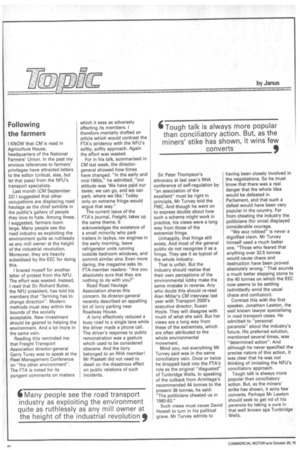Following the farmers
Page 42

If you've noticed an error in this article please click here to report it so we can fix it.
I KNOW that CM is read in Agriculture House, headquarters of the National Farmers' Union. In the past my envious references to farmers' privileges have attracted letters to the editor (critical, alas, but let that pass) from the NFU's transport specialists.
Last month (CM September 22) I suggested that other occupations are displacing road haulage as the chief exhibits in the public's gallery of people they love to hate. Among these, I suggested, farmers loom large. Many people see the road industry as exploiting the environment quite as ruthlessly as any mill owner at the height of the industrial revolution. Moreover, they are heavily subsidised by the EEC for doing this.
I braced myself for another letter of protest from the NFU. The effort was wasted. Instead, I read that Sir Richard Butler, the NFU president, has told his members that "farming has to change direction". Modern methods must stay within the bounds of the socially acceptable. New investment should be geared to helping the environment. And a lot more in the same vein.
Reading this reminded me that Freight Transport Association director-general Garry Turey was to speak at the Fleet Management Conference on "the other environment". The FTA is noted for its pungent comments on matters which it sees as adversely affecting its members. I therefore mentally drafted an article which would contrast the FTA's stridency with the NFU's softly, softly approach. Again the effort was wasted.
For in his talk, summarised in CM last week, the directorgeneral showed how times have changed. "In the early and mid-1960s," he admitted, "our attitude was 'We have paid our taxes; we can go, and we can park, where we like.' Today only an extreme fringe would argue that way."
The current issue of the FTA's journal, Freight, takes up the same theme. It acknowledges the existence of a small minority who park trailers in laybys, rev engines in the early morning, leave refrigerator units running outside bedroom windows, and commit similar sins. Even more daring, the magazine asks its FTA-member readers: "Are you absolutely sure that they are nothing to do with you?"
Road Road Haulage Association shares this concern. Its director-general recently described an appalling bit of lorry parking near Roadway House.
A lorry effectively reduced a busy road to a single lane while the driver made a phone call. The driver's response to public remonstration was a gesture which used to be considered obscene, And the lorry belonged to an RHA member! Mr Plaskett did not need to dwell on the disastrous effect on public relations of such incidents. Sir Peter Thompson's advocacy at last year's RHA conference of self-regulation by "an association of the excellent" must be right in principle, Mr Turvey told the FMC. And though he went on to express doubts about how such a scheme might work in practice, his views were a long way from those of the extremist fringe.
Unhappily, that fringe still exists. And most of the general public do not recognise it as a fringe. They see it as typical of the whole industry.
That is unfair. But the industry should realise that their own perceptions of the environmental lobby make the same mistake in reverse. Any who doubt this should re-read Alan Millar's CM interview last year with Transport 2000's executive director, Susan Hoyle. They will disagree with much of what she said. But her views are a long way from these of the extremists, which are often attributed to the whole environmental movement.
Mind you, not everything Mr Turvey said was in the same conciliatory vein. Once or twice he dropped back into the FTA's role as the original "disgusted" of Tunbridge Wells. In speaking of the cutback from Armitage's recommended 44 tonnes to the present 38 tonnes, he said: "The politicians cheated us in 1980-83."
Such views must cause David Howell to turn in his political grave. Mr Turvey admits to having been closely involved in the negotiations. So he must know that there was a real danger that the whole idea would be defeated in Parliament, and that such a defeat would have been very popular in the country. Far from cheating the industry the politicians (for once) displayed considerable courage.
"We woz robbed" is never a dignified claim. Mr Turvey himself used a much better one. "Those who feared that anything over 32.5 tonnes would cause chaos and destruction have been proved absolutely wrong." That sounds a much better stepping stone to the 40 tonnes on which the EEC now seems to be settling (admittedly amid the usual chaos and confusion).
Contrast this with the first speaker, Jonathan Lawton, the well known lawyer specialising in road transport cases. He admitted to "personal paranoia" about the industry's future. His preferred solution, mentioned several times, was "determined action". And although he never specified the precise nature of this action, it was clear that he was not thinking of imitating the NFU's conciliatory approach.
Tough talk is always more popular than conciliatory action. But, as the miners' strike has shown, it wins few converts. Perhaps Mr Lawton should seek to get rid of his paranoia by taking a cure in that well known spa Tunbridge Wells.
































































































































































































































